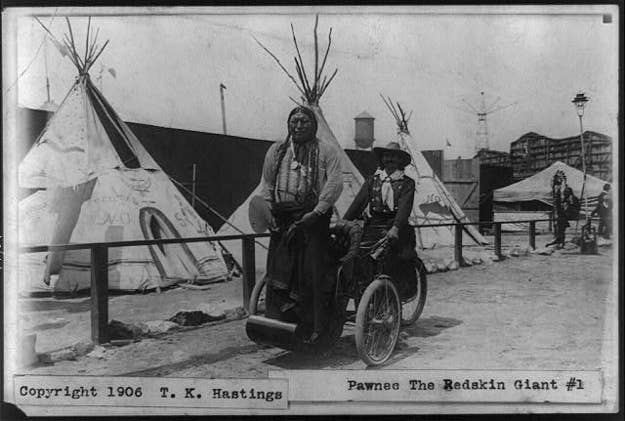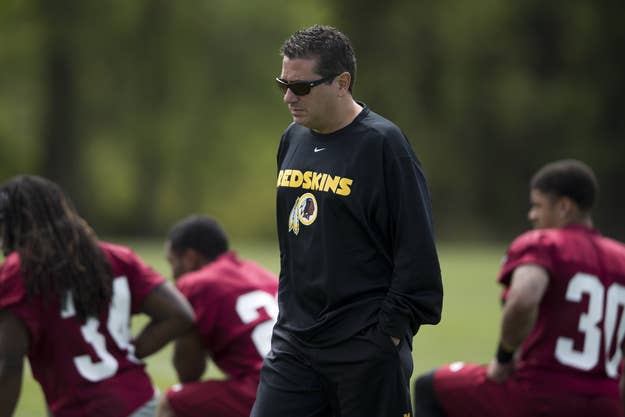
Update - June 12: The website Indian Country Today obtained and posted a letter from NFL commissioner Roger Goodell about the "Redskins" name. The letter is dated June 5 and addressed to the co-chairs of the Congressional Native American Caucus, both of whom were among the 10 congressional representatives who'd earlier sent a letter to Goodell asking him to move to change the name. Goodell argues that "Redskins" in the context of Washington football has "from its origin represented a positive meaning distinct from any disparagement that could be viewed in some other context."
In the United States, you can usually assume that the civil rights situation for any given minority group is going to get better over time. The process may take, you know, hundreds of horrible years, but for the most part, a group that's getting crapped on can at least know that things will be somewhat less awful in the future. Twenty years ago, for example, it would've been seen as stupid or quixotic to propose legal gay marriage or run for president as a black man. Now Washington, D.C., is home to a black president running a government that's rapidly ending organized discrimination against gays and lesbians. But D.C. is also home to an insult to civil rights and basic human decency that's demonstrated a surprisingly un-American resistance to progress: a football team with a racial slur for a nickname.
That would be the Redskins, of course, whose name is once again in the news thanks to a National Museum of the American Indian panel and a D.C. city council member who suggested changing it to Redtails in honor of the Tuskegee Airmen WWII fighter pilots. Redskins owner Dan Snyder got self-righteous about declaring that he'd never change the team's name, acting as if his stand against the dignity of a tiny minority group were some profile in courage. What's more, the public seems to be behind him: Only 11% of those surveyed in a recent Associated Press-GfK poll thought the name should be changed. The AP notes that this number is up only four percentage points from 1992, the last time the Redskins played in the Super Bowl and the last time a national audience was polled on the issue. And four points is the margin of error on the poll.
1992 happened to be a significant year for the gay-rights movement as well: a case challenging Hawaii's refusal to allow gay couples to marry was pending before the state's Supreme Court, while presidential candidate Bill Clinton campaigned on the position that gays should be able to serve openly in the military. The court case resulted in a 1993 decision leading Hawaii toward same-sex marriage; Clinton's move on gay rights led Congress to pass the "don't ask, don't tell" policy in 1993 as well. It was, in many ways, the beginning of the national debate about gay rights that is ongoing today. And the contrast between Americans' progressing attitudes toward gay people and their attitudes toward this particular American Indian slur in these last two decades is...significant. According to Gallup, American sentiment regarding the legalization of gay marriage has gone from 68%-27% against to 53%-46% in favor in the last 17 years. Now 77% of Americans say they know a gay person; that number was only 42% in the year Clinton was elected.
No one in the NFL or Redskins organizations need wait until a majority of Americans oppose the use of "Redskins" to do the right/obvious thing and change it, of course. But some movement on that front might force their hand. It's said that the best way to get someone to change their mind on gay rights is to have one of their friends or family members come out of the closet. But Native Americans are only 1% of the population, a portion that's even lower in D.C., which makes sense, because "Our Most Popular Sports Team Is Called [Your Ethnic Group] Sucks" is not a good slogan for selling people on moving to your city. It's going to take something besides person-to-person interaction to change the national mood (and the mood of D.C. fans) on the issue. You'd think that thing could just be taking a half-second to realize that it's absurd to have a football team with a racial-slur nickname in 2013. But that's what a reasonable person watching the Redskins might've thought in 1992 too, and two decades later, only the names on the backs of the jerseys have changed.

